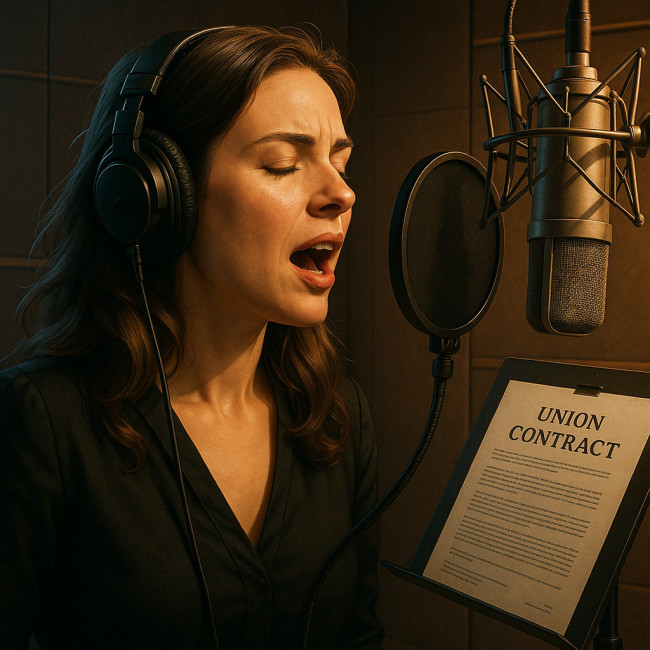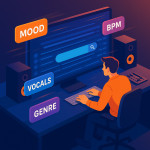SAG-AFTRA essentials: navigating union contracts for soundtrack vocal sessions
Booking a soundtrack vocal session under a SAG-AFTRA contract can feel like decoding a new language. This guide breaks down the rate sheets, clauses, and workflows so you step into the studio confident, compliant, and fairly paid.
Why a SAG-AFTRA contract matters for soundtrack singers
SAG-AFTRA membership gives you scale pay, pension & health contributions, and enforceable workplace protections. Producers also gain peace of mind: one agreement secures all performer rights and avoids costly re-negotiations.
- Guaranteed minimum fees—no undercutting.
- Reuse payments automatically triggered when tracks hit new markets.
- Streamlined paperwork compared with patchwork, non-union deals.
Need proof of how union scale compares to open-market rates? Check the latest benchmark analysis.
Know your contract options
1. The Theatrical & TV Basic Agreement
This agreement covers feature films and episodic series. Sessions default to a four-hour minimum, and musicians receive residuals aligned with each new distribution window.
2. Made-for-New-Media Agreement
If you sing for a streaming-only film or series, you'll likely fall under this contract. Rates mirror the Basic Agreement but offer flexible pension reporting for short projects.
3. Low-Budget & Ultra-Low-Budget Mods
Independent producers with budgets under preset thresholds can use modified contracts. These still protect you, just at tiered scale rates.
Before signing, cross-check any “modified” pitch with the official thresholds on the SAG-AFTRA contracts portal.
Decoding the key clauses
| Clause | What it means for you | Red flag if missing? |
|---|---|---|
| Session length | Four-hour minimum for solo/duo, two-hour for large choir. | Yes—could allow unpaid overruns. |
| Reuse & new use | Extra payments when track appears in trailers, ads, or albums. | Yes—loss of future income. |
| Overtime | Pro-rated at 30-minute increments once you exceed booked time. | Medium. |
| Pension & Health (P&H) | Currently 19% on top of scale, paid by producer. | Yes—long-term benefits vanish. |
| Vocal contractor | Appointed singer handles timecards and ensures lineup matches contract. | Low—but helps logistics. |
If a producer refuses reuse language, send them our primer on metadata & licensing essentials—it highlights downstream risks they avoid by staying union.
Follow the union-compliant booking workflow
- Lock your line-up. Confirm soloists versus ensemble sizes early to pick the correct rate tier.
- Submit the B-Form. The producer files this with SAG-AFTRA at least 24 hours before the session.
- Complete I-9 & W-9. Bring identification and tax forms; no paperwork, no paycheck.
- Sign Exhibit E on site. Time in, time out, song titles, and any overdub notes go here.
- Review the session report. Spot-check hours and P&H before leaving the studio.
Remote projects follow the same flow. For tech etiquette that keeps long-distance takes stress-free, visit our guide on remote composer–singer workflows.
Money talk: current SAG-AFTRA soundtrack rates

The 2024 rate sheet sets clear minimums. Soloists earn $466 for a four-hour block, groups of three to eight singers earn $243 each, and larger choirs receive $182 each. Overtime kicks in at $58 per half hour for soloists. Pension & Health adds 19 % across the board. These baseline figures adjust each July 1 to reflect cost-of-living bumps negotiated by the union, so verify the latest bulletin before locking a budget.
Source : SAG-AFTRA Rate Sheet 2024
*Overdub rate applies per singer when additional parts are layered after the initial four-hour block.
Tips to maximise income & compliance
- Stack overdubs smartly. Plan harmonies within session block to avoid avoidable overtime.
- Track vocal counts. Extra singers bump you into the next rate tier—budget for it.
- File mileage claims. Union contracts reimburse travel beyond 8 miles of the studio zone.
- Use the soundtrack singer directory. Producers can find pre-vetted union talent in seconds through the soundtrack singer directory.
Common pitfalls and how to avoid them
Below are issues singers report most often and quick fixes:
- Misclassified budget. Ask for the film's final cost report. If it exceeds a low-budget threshold, renegotiate at standard scale.
- Late payments. Scale contracts require checks within 15 business days. Flag delays to your SAG-AFTRA business rep.
- No paperwork for reuse. Keep a PDF of the session contract. You'll need Exhibit E to trigger trailer or soundtrack-album payments five years from now.
- Missing metadata. Provide labelled stems. This habit, explained in our layered-stem prep guide, ensures producers can match vocals to contracts during audits.
Interactive knowledge check
FAQ
- Can I waive overtime if everyone agrees?
- No. SAG-AFTRA classifies overtime as a mandatory payment. Verbal agreements do not override the contract.
- Does streaming reuse trigger residuals?
- Yes. When tracks migrate to new platforms, the producer must pay reuse according to the Streaming Supplemental Markets rates.
- What if I'm not yet a union member?
- You can work one Taft-Hartley session and pay initial fees within 30 days to stay compliant.
Take action now
Ready to lock your next session? Download the official rate sheet, bookmark this guide, and share it with any producer still confused about union rules. You deserve the protection—and the paycheck—SAG-AFTRA guarantees.
Book smarter, sing bolder. Your voice fuels the story; let the contract fuel your career.











